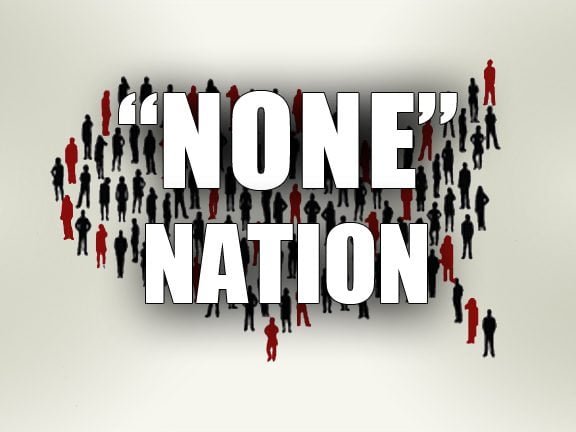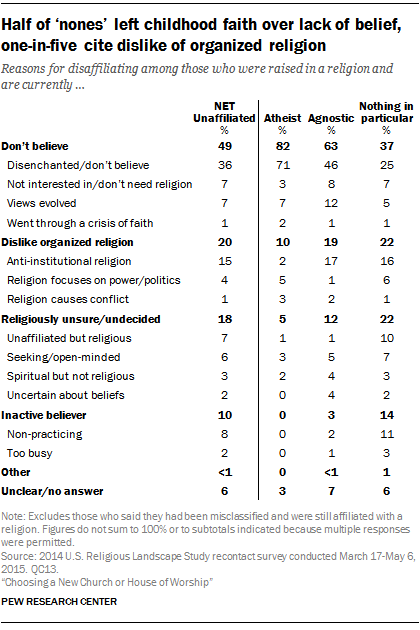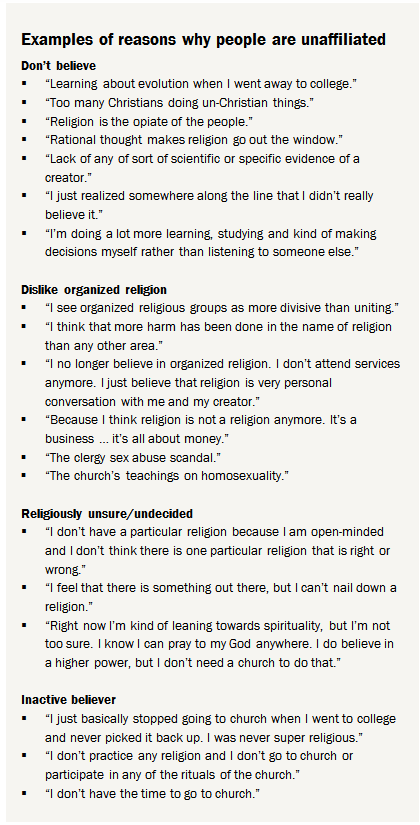
The Pew Research Center released a report today that shows that American Christian churches continue to face member indifference and attendance loss:
Perhaps the most striking trend in American religion in recent years has been the growing percentage of adults who do not identify with a religious group. And the vast majority of these religious “nones” (78%) say they were raised as a member of a particular religion before shedding their religious identity in adulthood.
As part of a new survey connected to our broader Religious Landscape Study, we asked these people to explain, in their own words, why they no longer identify with a religious group. This resulted in hundreds of different responses (after all, everyone’s religious experience is a bit different), but many of them shared one of a few common themes.
About half of current religious “nones” who were raised in a religion (49%) indicate that a lack of belief led them to move away from religion. This includes many respondents who mention “science” as the reason they do not believe in religious teachings, including one who said “I’m a scientist now, and I don’t believe in miracles.” Others reference “common sense,” “logic” or a “lack of evidence” – or simply say they do not believe in God.
But there are other reasons people give for leaving behind their childhood religion. One-in-five express an opposition to organized religion in general. This share includes some who do not like the hierarchical nature of religious groups, several people who think religion is too much like a business and others who mention clergy sexual abuse scandals as reasons for their stance.
One-in-ten religious “nones” who say they were raised with a religious affiliation are now classified as “inactive” religiously. These people may hold certain religious beliefs, but they are not currently taking part in religious practices. And most of them simply say they don’t go to church or engage in other religious rituals, while others say they are too busy for religion.
Religious “nones” are by no means monolithic. They can be broken down into three broad subgroups: self-identified atheists, those who call themselves agnostic and people who describe their religion as “nothing in particular.” Given these different outlooks, it is not surprising that there are major gaps among these three groups when it comes to why they left their childhood religion behind. An overwhelming majority of atheists who were raised in a religion (82%) say they simply do not believe, but this is true of a smaller share of agnostics (63%) and only 37% of those in the “nothing in particular” category.
What do you think American Christianity will look like in 2030? Please leave your thoughts in the comment section.



Why did I stop believing? Ultimately, believers never really demonstrated any better “inner light” than nonbelievers, and were often worse. When those blinders started lifting, everything became clear, and the concept of a god became a bit unbelievable.
“What do you think American Christianity will look like in 2030?”
Hopefully gone. If not, maybe shrunken down in membership and in socio-political influence.
I’m thinking the Nones will be a majority (possibly better) by 2030. This may or may not translate into the political muscle that is needed to overthrow a lot of the unwarranted religious privileges, like ceremonial deism, non-taxation of churches, and clergy housing. There is question on this because the majority of the Nones aren’t activists, and quite the opposite as being a “none” is almost synonymous with apathy . Taking down the status quo is also a bit of a trick, as people are already accustomed to these things.
I was thinking the rise of the Megachurch might bode well for organized religion. After researching them I have a distinctively different opinion. Megachurch members are basically religious Nones. The services of a Megachurch are watered down Christianity, with very little challenging dogma. The services are typically motivational speaking sessions. In a way people flocking to them is very similar to the zombies in “Dawn of the Dead” returning to the mall. The mall was a place of familiarity, a place that they could remember even if they didn’t know why.
Two distinct hold outs will be Mormon Utah and surrounding areas as well as the rural south. Mormons because of the shunning and ostracizing behavior against ex-members and the south, because it is still the Bible belt.
Hard to say what 20 years will bring. Based on my past experiences:
Nones will continue to grow as a group; mostly because it is such a large group now, children will be raised withou any religious experience. The athiesim/unbelief will be for the same reason that people were Christians in the 50’s and 60’s- they were born into it.
Mega churches will continue to be relevant with the young, hip group. These are people who have questions that can’t be readily answered or who feel an emotional need that they can’t fill elsewhere. Some people will come from the “none” crowd, some will come from the fundamental crowd. As the people get older, many will become a none, while retaining religious beliefs.
Fundamental groups, such as IFB, Calvinistic/Sovereign Grace, Reform Baptists and their kind, will shrink in membership, but become more outrageous in their beliefs. They will loose young people, due to the fact the kids want to experience the pleasures of the world. Adults who come into this later in life have already had fun and made their money or have established jobs. Even among fundamentals, the marrying of the church and the world will grow. There is no way for it not to happen. I’m sure even Steven Anderson has snuck some movie or TV once in a while. I know this because I grew up in a house where Anderson would have been considered a liberal. No one is perfect.
Catholics and Protestant denominations will continue to loose relevance in America. Weddings, funerals, Christmas and Easter will keep people coming back, but the faithful will fall away. Soon, only the old will be left, dragging their grandchildren with them.
I don’t have any experience with what Baptists would call cults- Mormons, Jehovah’s Witnesses, and such. They keep building new buildings and have very full parking lots on Sundays.